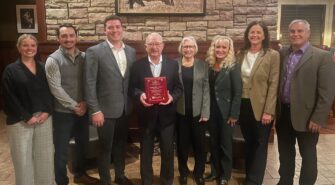3 Family Businesses Honored with Awards from Prairie Family Business Association
Recent News
S.D. leads nation in family businesses — these strategies can help that continue
Posted in PFBA | June 12, 2024
More than four in 10 businesses in South Dakota are family-owned, ranking the state No. 1 in the nation.
That’s according to OnDeck, which recently released an annual family business survey that found 41.5 percent of South Dakota businesses are family owned, more than 2 percentage points ahead of No. 2 Idaho.
“The state and the region are supportive and encouraging of family businesses. Consumers actively support family businesses, and there is a can-do attitude for family business owners,” said Stephanie Larscheid, executive director of the Prairie Family Business Association.
“Within the families we serve, the largest industry represented is manufacturing. However, farming and ranching families are an increasing industry we serve. Agriculture is likely one of the reasons why South Dakota is ranked high nationally in the number of family businesses in the state.”
Family-owned businesses also employ a significant number of people in South Dakota — estimated at 45.46 percent by OnDeck, ranking the state third in the nation behind Maine and Rhode Island.
“South Dakota has maintained a steady population of locally born inhabitants over the past half-century, and nearly every farm is family owned,” according to OnDeck.
“However, the state’s leading industry may need fresh blood as the workforce ages — around two-thirds of South Dakota farmers are at least 55 years old. Generation-spanning rural work also benefits from an occasional check-in with business experts, who can help family businesses capitalize on their strengths.”
Those are people like Agatha Johnson, who was quoted in the report touting her client: family-owned, agricultural manufacturer MDS Manufacturing of Parkston.
Johnson is the founder of WillKate, which supports family businesses with services such as transition planning, strategy and governance, leadership development, conflict resolution and wealth management.
To her, the state’s ranking isn’t surprising.
“South Dakota is a very friendly state in crucial areas of business such as business support by financial institutions, support from each other, educational institutions, and family and community cohesiveness,” she said. “A critical aspect of this is that South Dakota supports startups and the entrepreneurial spirit that all businesses and family businesses must have in each generation.”
The competitive cost of doing business in South Dakota, financial support for small businesses and a reliable labor force are additional factors that support success in the state, she said.
“However, what makes families strong enough to continue to grow and transition is the entrepreneurial spirit and the desire to evolve in their relationships such as family to family, leading in business and self-growth,” Johnson said.
“This debunks the view that families are different and dysfunctional and fight over money or lose it. Truth be told, all humans have issues and challenges in relationships, not just families. But we find that with the right support, many families in South Dakota are willing to put in the work as families grow together personally and in business.”
South Dakota needs to be mindful that its overall percentage of family businesses has gone down slightly in the past year. While the drop is less than 2 percent, it’s something family business experts are ready to help prevent.
“The more you work on your business and put structure into place, the more likely you are to have successful outcomes. Our mission is to provide tools to help the business remain family owned,” Larscheid said. “As an association, we are accessible. We meet the family where they are, both within their journey and their physical location. Several of our programs enable family businesses to flourish and remain family owned.”
For instance, Prairie Family Business Association programs include:
- Live case studies, where PFBA will help conduct your family meeting along with a team of advisers. You’ll leave with answers to questions such as “Where do we begin?” “Who do we involve” and “What strategies are going to be best for our family and our business situation?”
- Affinity peer groups, where individuals can talk through issues related to family, business and their own personal and professional development. You’ll find that joining a community of like-minded individuals who can understand, relate and help get to solving issues can be very powerful.
- Next-gen development, which will be a focus of the upcoming Next Gen Retreat in the Black Hills in early October.
“By implementing the best practices we recommend such as family meetings, strategic planning and a board, the business will become overall more successful and more attractive,” Larscheid said.
“This way, the business and family are more prepared for whatever unforeseen opportunities or strategies are presented. We are in a climate that is ripe with merger and acquisition opportunities. Having the business in order will enable family and business conversations and opportunities to be more seamless.”
There’s also interest among ag-based family businesses in succession planning, Larscheid said.
As an example, Prairie Family Business Association recently presented at the South Dakota Dental Association. A number of dental practices in the audience were multigenerational, “however, there was equally as much succession-planning interest in the audience for their family or their farm or ranch operation,” she said.
“In this part of the country, we may have one main business, but we may also have business interests on the side, especially when it comes to farming and ranching. There is a strong emotional desire to keep the land or the operation in the family for future generations.”
Historically, the path to moving a business or wealth into the next generation would be for children to buy out the parents, shares in the business would be gifted to family members or the business itself would be liquidated, Johnson said.
“While these legacy models are still an option, today’s investing families are considering various approaches to managing and enhancing their wealth, including allowing family members to pursue new opportunities actively,” she said.
“Enterprising families are open to expanding beyond the legacy business. Innovation in the world at large is important to create the next entrepreneurial engine and retain the capital within the family. Companies might come and go, but you can sustain that wealth across generations.”
These families “move beyond defining themselves as owning a family business to being an enterprising family in business together,” she continued. “The benefits — such as the ability to pursue opportunities that align with family members’ values and engage the next generation — can be huge. Not to mention that families can survive beyond a legacy business that may no longer be relevant to the marketplace.”
Sometimes, the family business is no longer relevant, or a sale might be necessary to reset and reinvent, she said. But that still opens up opportunities for new family business creation as proceeds are invested in new ventures.
“Our great family businesses and community didn’t grow by default,” Johnson said. “Like all private and family businesses, it starts as a dream and vision; it evolved through the dedication, continuous planning, strength, human capital development of family members and innovation needed, along with support from others to make it happen.”
Prairie Family Business Association has the support many families are seeking in their family business journey. To learn more about the resources available, start by clicking here.










